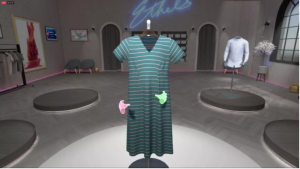“So Hiro’s not here at all. He’s in a computer-generated universe that his computer is drawing into his goggle and pumping into his earphones. In the lingo, this imaginary place is known as the Metaverse. Hiro spends a lot of time in the Metaverse.” And if Facebook gets its way, so will you.
Michael Abrash, chief scientist at Facebook’s Oculus business and a key figure in its VR efforts, said in a blogpost: “It all started with Snow Crash.”
(The Guardian, 28 Oct 2021)
Utopian version
“Remember to take a break from your coding game classes today, Akin!’ called her mother. ‘Not again!’ Akin grumbled to herself. As usual when she went to sleep, Akin had turned off the visual view on her neural implant but had forgotten to switch off the sound so she could hear her mother loud and clear even though she was in Lagos visiting family. Akin reached over to the family robotic helper holding her morning beans and bread, then sat up in her bed pillows to get her body more comfortable. She switched on the full immersive control for her implant. Her digital teacher had assessed her physiological responses to learning at different times of the day, and she and her teacher agreed that early mornings were best for any concentrated learning. Later in the day, she was less focused, so Akin would usually choose more physical, experiential learning pathways.

Source: UNESCO
Being an 18-year-old university student was so different from what her grandparents described from their youth way back in the 20th Century. Back when the ‘Internet’ was something new, and before the metaverse even started! They said they had to go to classes in-person and sit to listen to the same tired teachers for hours and handwrite in paper books! Still, they pointed out that going to university was a big accomplishment and challenge for the average Nigerian family back in the 1980’s. This was back before the big shift in 2030, when the big universities of the world opened their courses to the world, and personalized learning truly began through this merging of universities and the metaverse. Back before there was a global set of privacy and data-sharing laws put into place to protect each individual’s data within the metaverse. Akin knew she was lucky to have grown up experiencing this new kind of education and being able to make friends from all over the world through the metaverse. But her mother still chided her that she should not take it for granted that she, a young girl living in a small town in Nigeria, could meet with these friends from Hong Kong, Ireland, Brazil, from all over the world, and explore any environment they chose, at any time in history! Luckily, there were always AI guides to help keep them safe because it turns out that some parts of history were really violent and dangerous!
Akin switched on her ‘university’ avatar and checked what new selections of clothes she could put on her virtual self. She paid for these clothes with a few NFTs she kept in her files. Today she wanted to wear something warm, maybe a sweater, long pants and definitely boots because later in the day she was planning to meet her classmates from Geology 101 in the ‘Mount Kilimanjaro Experience’ so they could learn how the mountain’s glaciers had been seeded to start growing in size since the international community of nations had banded together to de-carbonize and reverse climate change back in 2022.

Source: Screenshot Meta
Fully settled into her immersive skin, Akin looked around her favourite virtual room for her dataspace where she kept her ‘books’ and ‘pens’ – it was pretty trendy right now for university students to write things on ‘paper’ using printed or cursive script. Her digital teacher told her that there was research from decades ago that showed humans remembered things better when they wrote them by hand. Akin wasn’t so sure, since most of what she remembered in her classes were based on her experiences, touching, smelling, hearing and seeing these learning activities, but she liked the ‘feel’ of the pen in his hand and the crispness of the paper was unique. Maybe he would take some notes after his first code gaming class this morning, it was an interesting experience to try to write like that.
_________________________________________________________________________________________________________________________________________
Dystopian version

Source Illustration: Sarah Grillo/Axios
‘Time to WAKE UP for your morning data pump!’, Akin blearily opened his eyes. The computer screen from across the room was turned on and beaming bright angry lights at him. “It’s time to log in to META now and start your morning data pump.’, the voice repeated again, this time more forcefully. Akin was tired. He had been logged into the META until late last night trying to earn some money for his family. School had ended for him when he was 12 because the Nigerian government did not have enough money to sign a contract with META for its citizens to have a university experience, and META was the only educational provider – in the world. META controlled all media, and all of the metaverse, so only those wealthy enough could afford access to things like a higher education. Climate changed had ravaged Akin’s country, creating flooded lagoons and destroying past livelihoods.

Source: Screenshot VOA
It was true that ordinary citizens like Akin could put on a used pair of ‘smart glasses’ to access the metaverse, and this didn’t cost anything, as long as you agreed to let META use all of your data to sell to the highest bidder. Anything Akin felt or reacted to on the META was logged, analysed and sold off. Akin had been spending his days and most nights on META since he was a child as a distraction from the increasing environmental and social despair around him. This was what all the children did. No one bothered to play or go outside – it was dangerous, too hot, and kind of boring.

Source: Screenshot Game News 24
However, since he had turned 18, the AI marketing holograms had told him that because of his age and ethnicity, as a young Nigerian man in a region growing faster than any other part of the world, Akin was eligible to earn a few NFTs a day if he agreed to take part in different educational experiences and have his reactions analysed and sold. Akin had thought at the time, why not? I’m already on META most of the time, and no one had offered him anything called ‘education’ for years. He couldn’t imagine there would be anything worse than wandering around this immersive environment watching wealthier people from around the world take part in experiences he could never afford. What he didn’t realize was that small, private universities from wealthier countries had aligned with META to begin training their algorithms to support wealthy children to experience more in their immersive classes – things that might frighten or potentially hurt these children. Of course, no paying parent would allow their child to be immersed in META to live through the Hiroshima Nuclear accident or the gas chambers of World War II. So, the educators and designers at META had come up with an idea: pay ‘willing’ students to go through these experiences first, record their reactions to ‘death’ and mass violence, then use this to train the AI algorithms so the wealthy, paying students could safely be guided through these important historical events. This was what Akin had naively signed up to be: a test student to be shocked, attacked, suffocated, and terrified, day after day, in a contract that was unbreakable for five years’ worth of daily data pumps. At the end of each day, Akin earned 5 NFTs, that could be transferred to his family’s old laptop and exchanged for some food. Akin was his family breadwinner, which was all that kept him alive.